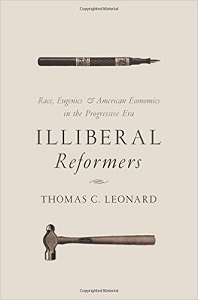The adoption by the State of Indiana of a law restricting abortions offers an opportunity to review some economic, or economically-inspired, arguments on both sides of the debate (“Indiana Passes Near-Total Abortion Ban, Marking First State Restrictions Since Roe v. Wade Overturned,” Wall Street Journal, August 6, 2022).
Because normative economics assigns value equally to all individuals, economists—or at least a large number of them, including this blogger—implicitly oppose murder, whatever the balance of utilities, even if the murderer gets more utility from it than his victim loses (if such comparisons have any meaning). Hence, the question of whether the fetus is a human being and, if so, whether abortion is murder or justifiable homicide has some importance.
The defense of “reproductive rights” is suspicious. If “rights” mean anything precise, reproductive rights must be the freedom to reproduce if one wants to, is physically able to, can get a partner (or a surrogate), and other such conditions. The paradigmatic violation of reproductive rights in recent times was the eugenic policies promoted by progressives (mainly) in the first part of the 20th century. Under American eugenic state laws, in force between 1907 and 1980, 65,000 women were forcibly sterilized. (See Paul Lombardo, Three Generations, No Imbeciles: Eugenics, the Supreme Court, and Buck v. Bell [John Hopkins University Press, 2008]; and Thomas Leonard, Illiberal Reformers: Race, Eugenics & American Economics in the Progressive Era [Princeton University Press, 2016].) Reproductive rights do not imply the right to kill the reproduced individual, just as marriage rights do not imply the right to kill your spouse.

Doesn’t the life of a human being, even potential, have some value? Is the fetus less human than an old person victim of a stroke or Alzheimer’s? These questions underline the importance of affirming the value of human life.
To those who invoke the welfare of future generations when it serves their own political purposes, we may ask what future individuals think about the probability of being aborted. If one imagines that future individuals are invited to our social contract (admittedly a big imagination stretch), what is the probability that many of them would consent to “reproduction rights” as conceived by the unconditional supporters of abortion? A time inconsistency problem is lurking here: the future individuals who consent to very permissive abortion rules now may in fact never be born and thus have no voice in any social contract.
This being said, the principle“ My body, my choice” is enticing for whoever takes seriously the normative implications of economics. So is the “Bans off our bodies” slogan that some Indiana House Democrats were wearing—assuming it equally applies to the other sex. Economists naturally assume that an individual is the owner of his own body. In current discourse, however, the slogans above seem to apply only to abortion. Don’t they apply as clearly as, if not more clearly than, peaceful and contractual acts, like an adult choosing to work for less than a state-decreed minimum wage in order to use her body to earn a living? Don’t they apply if she wants to wear a gun on her body in order to protect that body against violent aggressions? And so forth.
A consistent argument for “My body, my choice” cannot be summarily dismissed. It was used in a classic defense of abortion by philosopher Judith Jarvis Thomson, published in 1971 in Philosophy and Public Affairs and simply titled “A Defense of Abortion.” Thomson argued that even if we admit that the fetus is a human being, there is no defendable philosophical argument for preventing his (or her—yes, fetuses can be girls too!) mother from detaching him from her body. If it leads to the death of the fetus, abortion would not be murder, but justifiable homicide like in self-defense.
Thomson’s demonstration is a general libertarian my-body-my-choice argument that applies to any non-voluntary obligation to help others. She emphasizes the difference between, on the one hand, a morally commendable action (keeping the child you have conceived even if it implies large costs), and, on the other hand, owing somebody a right to assistance as if it has been voluntarily contracted for and can thus be imposed by force. (For this post, I reread Thomson’s article after several decades; it may be changing my opinion on abortion.)
In the famous article, Thomson wrote:
I am arguing only that having a right to life does not guarantee having either a right to be given the use of or a right to be allowed continued use of another person’s body—even if one needs it for life itself. So the right to life will not serve the opponents of abortion in the very simple and clear way in which they seem to have thought it would. …
If a set of parents do not try to prevent pregnancy, do not obtain an abortion, and then at the time of birth of the child do not put it out for adoption, but rather take it home with them, then they have assumed responsibility for it, they have given it rights, and they cannot now withdraw support from it at the cost of its life because they now find it difficult to go on providing for it. If they have taken all reasonable precautions against having a child, they do not simply by virtue of their biological relationship to the child who comes into existence have a special responsibility for it.
Note that Thomson does not think her argument morally or legally justifies all abortions:
While I do argue that abortion is not impermissible, I do not argue that it is always permissible. … A merit of my account [is] precisely that it does not give a general yes or a general no. …
While I am arguing for the permissibility of abortion in some cases, I am not arguing for the right to secure the death of the unborn child. … I agree that the desire for the child’s death is not one which anybody may gratify, should it turn out to be possible to detach the child alive.
I don’t think she satisfactorily explained when impermissibility is only a moral obligation and when it should be backed up by a legal ban. And did she underestimate the degree of responsibility of the mother (and the father too) in the conception of a human being?
Except for the ban on aborting fetuses with serious but non-lethal genetic abnormalities as well as some authoritarian features of its enforcement, the Indiana law may not be so radically different from Thomson’s guidelines—at least if the WSJ’s description is correct, notwithstanding the story’s title:
The ban, which takes effect Sept. 15, includes some exceptions. Abortions would be permitted in cases of rape and incest, before 10-weeks post-fertilization; to protect the life and physical health of the mother; and if a fetus is diagnosed with a lethal anomaly.


READER COMMENTS
Bill Drissel
Aug 8 2022 at 11:26am
<quote>Hence, the question of whether the fetus is a human being and, if so, whether abortion is murder or justifiable homicide has some importance.</quote>
We only use the word, fetus, rather than unborn child only when we are considering killing an unborn baby. The unborn child is unquestionably human. Even ignoring modern DNA evidence, everyone knows that no woman has ever given birth to a kitten or an oak tree. Furthermore, DNA shows the unborn child to be an individual human distinct from his mother. This fact destroys the “My body, my choice” argument.
Stop calling the destruction of unborn babies “abortion.” Call it instead “killing unborn babies for money.”
Regards,
Bill Drissel
Pierre Lemieux
Aug 8 2022 at 11:49am
Bill: Call it as you wish, but labels don’t change the substantive argument. Thomson’s argument is a weighty one, and I would suggest that anybody who thinks he disagrees engage with it and criticize it (after reading her article).
Jonathan S
Aug 8 2022 at 11:49pm
Perry Hendricks uses similar reasoning as Thomson to justify the anti-abortion position. As you noted in the blog post Thomson argues that even if the fetus is a person, abortion should still be legal. Hendricks argues that even if the fetus is not a person, abortion should not be legal.
Pierre Lemieux
Aug 9 2022 at 12:13am
Jonathan: Thanks for the link. I have skimmed through the paper rapidly and will keep it for future reference. The author does not reply to Thomson’s self-defense argument and to the violinist thought experiment (summarized in the MIT obituary I linked to). His argument would imply that if somebody squats your home, you have no right to throw him out if that would impair him; perhaps you have no right to impair a robot sent into your home. It seems to be a very weak argument, much weaker than the standard right-to-life one.
Jonathan S
Aug 9 2022 at 10:40am
I was referring more to their similarities in how they approach the topic (Thomson’s approach is fine accepting the most basic anti-legal abortion premise; Hendricks’ approach is fine accepting the most basic pro-legal abortion premise). Hendricks does address Thomson’s argument, and a similar argument by David Boonin, in other papers.
Regarding evicting a squatter in your home, my guess is that Hendricks would argue that a squatter is not impaired when evicted.
Mark Brady
Aug 8 2022 at 7:20pm
I clicked on your statement that “normative economics assigns value equally to all individuals” in search of a definition of normative economics. Yet nowhere in your article on James Buchanan, do you use the phrase normative economics, let alone define the concept. It’s one thing to have a normative discussion about economic topics, or about topics in, say, geography or biology, but, I suggest, it isn’t helpful to call that approach normative economics, or normative geography, or normative biology.
Pierre Lemieux
Aug 8 2022 at 8:31pm
Mark: That is a good point. I should have explained what I meant, that is, fields or implementations of economic analysis that incorporate assumptions about, or discussion of, moral values and “the philosophical implications of he science of economics” (Buchanan). The old Welfare Economics was normative economics; Mishan had a book called An Introduction to Normative Economics. A moral judgement is required to justify any distribution. The recycled term of “political economy” now describes the sort of analysis that James Buchanan did in Why I, Too, Am Not a Conservative—and that Adam Smith also did when economics was a “moral science.” For example, consumer surplus, the contract curve, or the benefits of exchange have no normative significance for public policy if we don’t assume that each individual adult is capable of choice. In this perspective, I guess, eugenics was normative biology. Any disagreement?
David Seltzer
Aug 10 2022 at 6:52pm
Pierre: Well reasoned and written, as always. What occurs to my libertarian soul, the in utero life is forced into an involuntary transaction. How does it defend itself from harm save for the law?
Jens
Aug 12 2022 at 9:23am
If it were capable of defending itself, there would be no need for specialized law.
Jens
Aug 12 2022 at 9:26am
For the discontinuous mind, deadline regulations are a horror and only appear in footnotes and subordinate clauses.
Comments are closed.